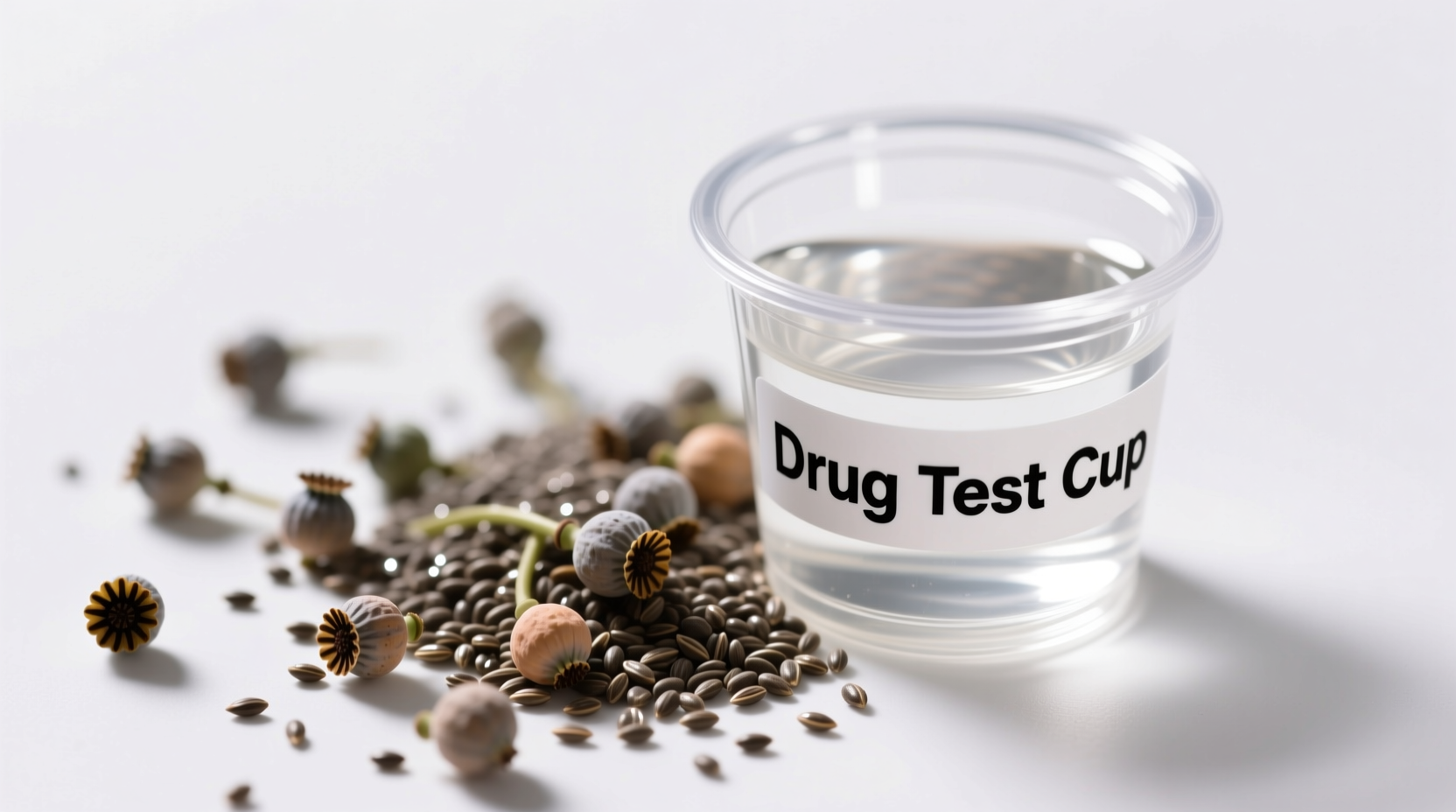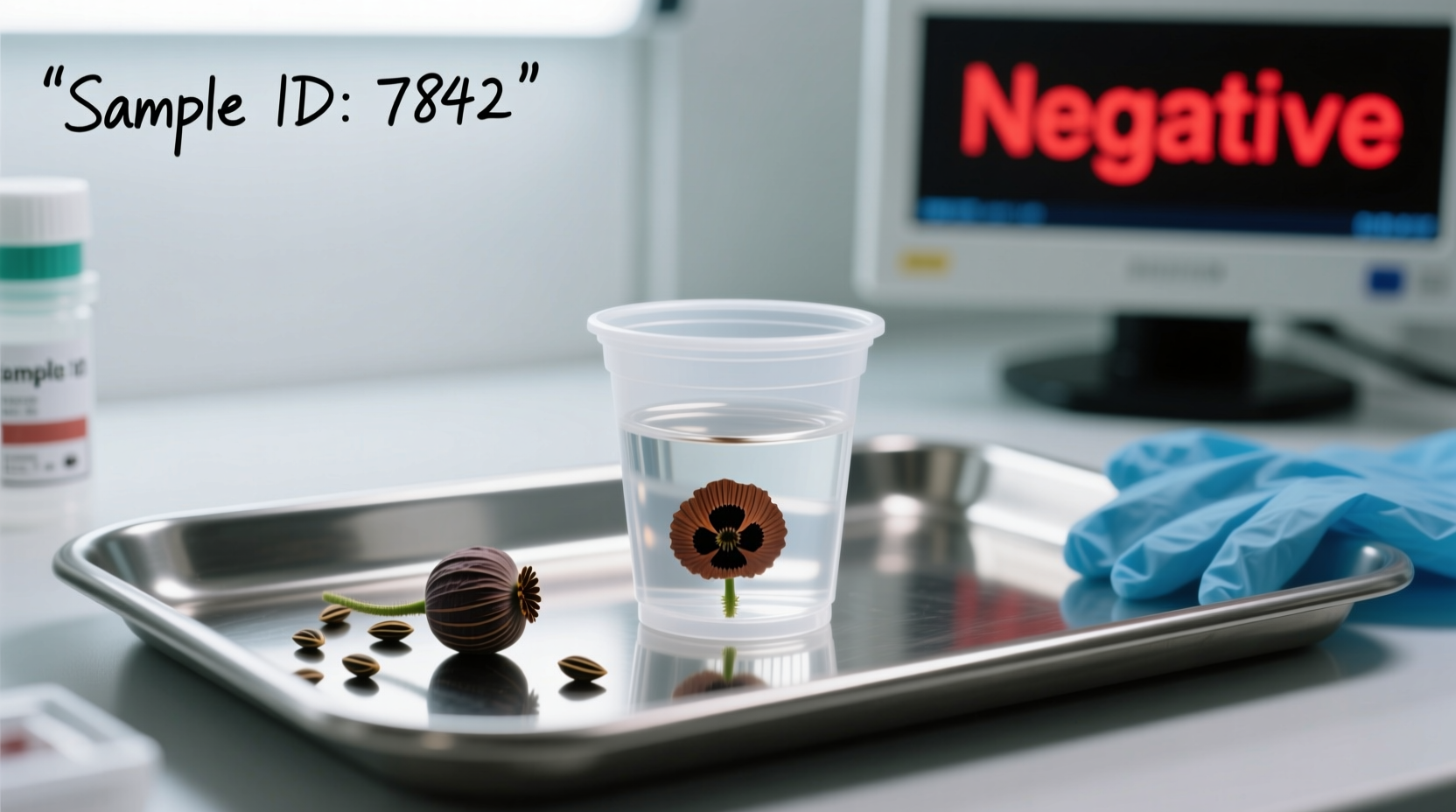Why Poppy Seeds Trigger False Positives on Drug Tests
Poppy seeds come from the Papaver somniferum plant, the same source used to produce opium-derived drugs like morphine and codeine. While the seeds themselves don't contain significant opium, they often become contaminated during harvesting when seed pods are cut open. This contamination introduces trace amounts of morphine and codeine that your body processes after consumption.
"The relationship between poppy seed consumption and opiate detection is well-documented in forensic toxicology," explains Dr. Rebecca Collins, a clinical toxicologist at the National Institute on Drug Abuse. "Even a single poppy seed muffin can produce urine morphine concentrations exceeding standard drug testing cutoff levels."

How Much Poppy Seed Causes a Positive Test?
The amount needed to trigger a false positive varies significantly between individuals, but research shows:
| Poppy Seed Consumption | Typical Morphine Levels | Positive Test Risk |
|---|---|---|
| One poppy seed bagel (1-2 tbsp seeds) | 300-2,000 ng/mL | High (above 300 ng/mL cutoff) |
| Two poppy seed muffins | 1,500-5,000 ng/mL | Very High |
| Small sprinkle on salad | 50-300 ng/mL | Low to Moderate |
Standard workplace drug tests typically use a 300 ng/mL cutoff for morphine. As the table shows, even modest consumption can exceed this threshold. The Department of Defense has documented cases where service members tested positive after eating poppy seed-containing foods, leading to disciplinary actions before the cause was identified.
How Long Do Poppy Seeds Affect Drug Test Results?
The detection window depends on several factors including your metabolism, hydration, and the amount consumed. Here's the typical timeline:
- 0-24 hours: Highest risk period. Morphine concentrations peak 8-12 hours after consumption
- 24-48 hours: Moderate risk. Most standard tests will still detect morphine above threshold levels
- 48-72 hours: Lower but possible risk. Some sensitive tests may still detect traces
- 72+ hours: Very low risk for standard consumption amounts
The Substance Abuse and Mental Health Services Administration (SAMHSA) updated their guidelines in 2020, raising the initial opiate screening cutoff from 300 ng/mL to 2,000 ng/mL specifically to reduce false positives from poppy seed consumption. However, many private employers and organizations still use the older, more sensitive thresholds.
Understanding Different Drug Test Types
Not all drug tests react the same way to poppy seed consumption:
- Urine tests: Most vulnerable to poppy seed false positives. Standard immunoassay screening tests cannot distinguish between morphine from seeds versus illegal opiates.
- Blood tests: Less likely to show false positives as they measure recent use more precisely, but still possible shortly after consumption.
- Hair tests: Generally not affected by poppy seeds as they detect drug metabolites incorporated into hair follicles over time, not one-time consumption.
- Confirmatory GC/MS tests: If your initial test is positive, a gas chromatography-mass spectrometry (GC/MS) test can differentiate between poppy seed consumption and illicit opiate use by examining metabolite ratios.
Practical Advice If You Have an Upcoming Drug Test
If you're facing a drug test, follow these evidence-based recommendations:
- Avoid poppy seeds for 3-4 days before testing: This is the most reliable prevention method. Check ingredient labels carefully as poppy seeds appear in unexpected products.
- Request a confirmatory test: If you test positive despite no drug use, immediately request GC/MS confirmation which can distinguish dietary exposure from illicit use.
- Document your food intake: Keep receipts or photos of meals containing poppy seeds to support your case if needed.
- Know your employer's policy: Some organizations have specific protocols for handling poppy seed-related positives.
The Food and Drug Administration notes that "poppy seed consumption remains one of the most common causes of false positive opiate tests in workplace screening programs." Understanding these risks can prevent life-altering consequences from something as simple as enjoying a poppy seed bagel.
Special Considerations for Specific Populations
Certain groups face heightened risks from poppy seed consumption before drug testing:
- Healthcare workers: Many hospitals maintain zero-tolerance drug policies where false positives can lead to immediate suspension.
- Commercial drivers: DOT-regulated employees face mandatory follow-up procedures after any positive test.
- Parents in custody cases: Family courts may order drug testing where false positives could impact custody decisions.
- Military personnel: The Department of Defense has strict drug policies with limited allowances for dietary explanations.
According to military testing protocols, service members who test positive must provide documented evidence of poppy seed consumption within 72 hours of the test to avoid disciplinary action. The burden of proof rests entirely on the individual who tested positive.
Myths vs. Facts About Poppy Seeds and Drug Tests
Several misconceptions persist about this issue:
- Myth: Only large amounts of poppy seeds cause false positives.
Fact: Studies show even a single poppy seed roll can produce positive results. - Myth: Washing poppy seeds removes the opiate contamination.
Fact: The opiates are absorbed into the seed itself and cannot be washed away. - Myth: All drug tests can distinguish between poppy seeds and heroin.
Fact: Only confirmatory GC/MS tests can make this distinction; initial screens cannot.
The American Association of Clinical Chemistry confirms that "there is no safe amount of poppy seeds to consume before a drug test if you're subject to standard workplace screening protocols." Their research shows significant variability in how individuals metabolize the trace opiates from poppy seeds, making prediction impossible.
What to Do After an Unexpected Positive Result
If you've consumed poppy seeds and received a positive drug test, take these immediate steps:
- Don't panic: False positives from dietary sources are well-documented.
- Request confirmation testing: Insist on GC/MS testing which examines specific metabolite ratios.
- Gather evidence: Collect receipts, photos, or witnesses who can verify your poppy seed consumption.
- Consult a specialist: Seek guidance from a medical review officer (MRO) familiar with dietary false positives.
The College of American Pathologists notes that approximately 10-15% of initial opiate positives in workplace testing result from poppy seed consumption. However, nearly all are correctly identified as dietary exposure during the confirmation process—provided the individual can document their food intake.
Conclusion: Managing Your Risk
While poppy seeds add delightful flavor to many foods, their potential to cause false positive drug tests requires careful consideration. The safest approach is complete avoidance for 3-4 days before any scheduled drug test. If you do consume poppy seeds and face testing, understanding the science behind the false positive and knowing your rights can help you navigate the confirmation process successfully. Always remember that prevention through avoidance remains the most reliable strategy when drug testing is on the horizon.











 浙公网安备
33010002000092号
浙公网安备
33010002000092号 浙B2-20120091-4
浙B2-20120091-4